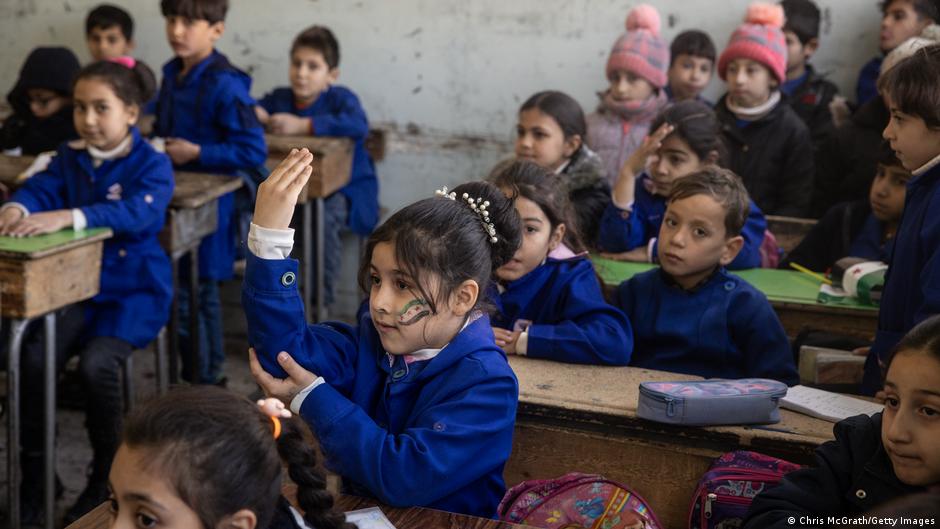When more than 3.5 million Syrian students took exams this week, the first since the fall of longtime ruler Bashar Assad, they didn’t have to answer questions on “Syrian nationalism” anymore.
The transitional education minister, Nazir al-Qadri, annulled the exam subject on short notice. The subject was based in large part on the glorification of Assad and his regime.
“For my older son this was good news, but for us, it rang a lot of [alarm] bells. We’ll have to wait for the next semester to see what will be taught instead,” Anas Joudeh, the founder of the Damascus-based civil society initiative Nation Building Movement, told DW.
As a father of a son in seventh grade and a son in second grade, Joudeh increasingly fears that Hayat Tahrir al-Sham (HTS), the group that ousted the Assad regime and set up an interim government in Damascus, “wants to put their fingerprint on the curriculum, just as Assad had changed the curriculum according to his ideology.
“This is a problem. Actually, this is a disaster.”
Islamist slant
Al-Qadri had previously worked for the education ministry in Idlib, the province in northwest Syria that had ben under HTS control for five years.
Cutting the exam subject was part of a nine-page list of changes for school curriculums the education ministry published on its official Facebook page in January.
For example, “defending the nation” was replaced by “defending Allah” or “those who are damned and have gone astray” to “Jews and Christians.” Additionally, the definition of a “martyr” was redefined from someone who died for a homeland to someone who had sacrificed their lives “for the sake of God.”
Al-Qadri has meanwhile downplayed the changes. In a statement, he said that the only instructions he had issued were related to the removal of content that he described as glorifying the “defunct Assad regime” and the statement of the Syrian revolutionary flag in all textbooks.
The minister also said that “inaccuracies” in the Islamic education curriculum had been corrected and that specialized committees will revise the updates, which are not yet scheduled but are set to be implemented before the beginning of the next school year in September.
Inclusive dialogue?
In turn, Joudeh remains worried that the sudden change could indicate that the transitional HTS government won’t keep its promise to hold a National Dialogue Conference that includes the multi-religious and multi-ethnic Syrian society in deciding these matters and impose its own ideology on the curriculum.
Scores of teachers took to the streets outside the Damascus-based Ministry of Education earlier this month. They condemned that the decision to change the curriculum was made without any input from teachers or civil society and questioned the transitional government’s actual right to make these changes.
HTS remains designated as a foreign terrorist organization by the United States and the United Nations over its links to the so-called “Islamic State” (IS) and al-Qaeda groups. The group is only meant to be the interim leaders of the Syrian government, yet it remains unclear when the caretaker government will hand over power.
HTS leader Ahmed al-Shara initially said they would only stay in office until March 2025. Later, he said that HTS would remain until the country has drafted a constitution in two or three years and would hold elections in around four years.
“Syrian leaders should involve the civil society organisations and the Syrian people in designing and building the new Syria, taking into account their experiences and perspectives,” Alice Gower, Director of Geopolitics and Security at the London-based consulting firm Azure Strategy, told DW.
“Syria’s education, in particular, is a vital component of creating a sense of unity and national identity.”
Millions of children in need
However, school curriculum is not the only concern on Syrian parents’ minds, as 14 years of war have eroded Syria’s education system on many levels.
Due to the fragmented political situation with the northwest being under HTS control, the semiautonomous Kurdish region in the northeast and some 70% of the country under government control, children were in different education systems, if at all.
While schools and universities were open under government control, millions of children in other areas were not enrolled in schools or attended some form of non-formal education offered, such as courses in community centers, at workplaces or on online platforms.
“Around 2.5 million children have not been attending school as a result of the war,” James Elder, spokesperson for the United Nation’s Children’s Fund (UNICEF), told DW. He added another million is in danger of dropping out.
A further result of the war is the dire condition of educational infrastructure. “One in three Syrian schools are still either destroyed or are being used as shelter for displaced families,” Elder said.
In his view, a dual approach is needed. “As the country moves forward into a new era, continuous collaboration is essential to design an inclusive curriculum that reflects the country’s rich diversity while at the same time, urgent investment in education is needed to strengthen existing systems and ensure that every child in Syria can resume or continue their learning journey,” UNICEF’s Elder said.
“The longer these children are out of school, the more they are exposed to child labor, child marriage, trafficking and recruitment by armed groups.”
Joudeh, the father and activist in Damascus, says the immediate future should be used to train teachers on how to communicate the transition and the near future to start a national reconciliation process.
“After all, we need to discuss the values and symbols of this nation,” he told DW, adding that in his view, the “curriculums are the most pressing issue.”
Edited by: Davis VanOpdorp
Why education and collaboration are key for stability – DW – 01/18/2025


